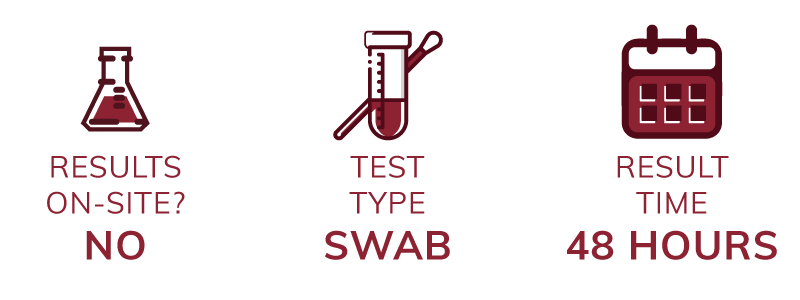Testing for COVID-19 has been an understandably popular topic in traditional and social media alike, complete with misinformation and plenty of questions. Since this is a topic we get many questions about, we wanted to address the different types of testing available, how the tests work, and at what stage of infection they should be used. The information listed underneath the test name is specific to our Neighbors Emergency Centers.
Here is a breakdown of the three types of testing available at Neighbors Emergency Center:
Diagnostic testing:
Performed for the purpose of diagnosing an individual with an active infection.
Antigen Test

Rapid antigen testing, or ‘real-time’ testing, can be quickly performed at the ER with a nasal swab. The test detects a viral protein in an individual with an active infection. Manufacturer-published information states that the test is 100% specific (Meaning: if it is positive it is 100% accurate), and that it is 80% sensitive (meaning: if it is negative, it is 80% accurate). If an antigen test comes back negative, but symptoms strongly indicate a potential COVID infection, a PCR or Molecular test can be performed for confirmation.
Molecular (PCR) Test

This is the most commonly used test in the US. Molecular testing detects viral genetic material (RNA) and is considered very accurate. These tests are performed with a nasal or (less commonly) oral swab. Because the genetic material has to be analyzed in a diagnostic lab setting, these tests take more time. If an antigen test is coming back negative, but you are experiencing COVID symptoms, then we may need to perform and send out a PCR test.
Non-Diagnostic Testing:
Antibody testing is performed to determine if your body is producing antibodies from a previous infection. It is not used to diagnose a current infection.
Antibody Test

Antibody tests determine if your blood contains the disease-specific proteins (antibodies) created to help fight off infections and provide protection against getting that disease again (immunity). Depending on when someone was infected and the timing of the test, the test may not find antibodies in someone with a current COVID-19 infection. Antibody tests should not be used to diagnose active COVID-19 infection.
All three types of testing are available curbside at Neighbors. Please visit our testing page to schedule an appointment. During periods of increased testing, test results may be delayed. As always, if you are experiencing an emergency, our Neighbors Emergency Centers are open 24/7 – even on holidays and weekends.
